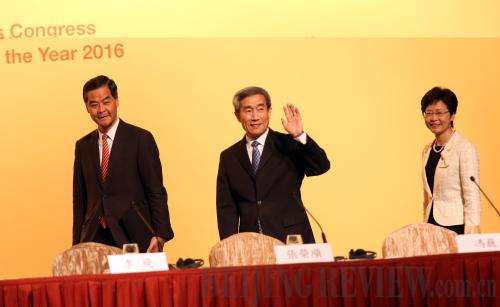|
 |
|
INTRODUCING UNIVERSAL SUFFRAGE: Li Fei (right), Vice Secretary General of the National People's Congress (NPC) Standing Committee, and Hong Kong Chief Executive Leung Chun-ying, before a briefing session on the NPC Standing Committee's decision in Hong Kong on September 1 (CNSPHOTO) |
A milestone
The first chief executive of the HKSAR was elected by a 400-member selection committee in early 1997, while the second, third and fourth chief executives were elected by an election committee, the membership of which had grown from 800 to 1,200 in the meantime.
In December 2007, the NPC Standing Committee resolved that the election of Hong Kong's fifth chief executive in 2017 may be implemented by the method of universal suffrage.
The latest decision said that "implementing universal suffrage represents historic progress in Hong Kong's democratic development and a significant change in the political structure of the HKSAR."
Speaking during the press conference on August 31, Li said the NPC Standing Committee's decision marked a "key moment" in Hong Kong's democratic development and is crucial to its current and future stability, as well as the fundamental interests of Hong Kong residents and foreign investors.
"Hong Kong has accomplished democratic progress it never enjoyed under the British rule of over 150 years," said Chen Zuo'er, head of the Chinese Association of Hong Kong and Macao Studies. "I should congratulate the Hong Kong people today for being so close to universal suffrage."
Speaking at an event on September 1 to discuss the NPC's decision, Hong Kong Chief Executive Leung Chun-ying said, "The majority of Hong Kong citizens—namely, the 5 million qualified voters of the selection of chief executive in 2017—will be able to cast their votes to select the chief executive."
"This is the first opportunity, a very good opportunity, for Hong Kong to have one man, one vote, universal suffrage. This is something we should all feel proud of," he added.
The HKSAR Government will now draft a detailed election proposal and consult the public in the coming months. A resolution detailing the reform will be given to the Legislative Council in the first quarter of next year.
Hong Kong's former chief secretary, Tang Ying-yen, said he supports the decision and hopes that the new round of public consultation will be launched at an early date.
The Hong Kong General Chamber of Commerce Chairman Pang Yiu-kai said that Hong Kong people wish to implement universal suffrage as soon as possible, and "it will be a historic milestone for Hong Kong if we can elect our ideal leader in 2017 through 'one person, one vote.'"
The Chinese General Chamber of Commerce appealed to all sectors of Hong Kong to put away prejudices and seek for consensus to implement universal suffrage and promote the democratic development of Hong Kong.
The Chinese Manufacturers' Association of Hong Kong said the decision created a clear framework for Hong Kong's constitutional reform, and it will be helpful to the Hong Kong government and different sectors in accelerating the process of democracy.
The Democratic Alliance for the Betterment and Progress of Hong Kong, the biggest political party in Hong Kong, said the decision marked an important step in Hong Kong's constitutional reform, and it calls on the region's society to concentrate on discussion and build consensus.
"The nominating committee shall nominate two to three candidates for the office of chief executive in accordance with democratic procedure," the decision read. "Each candidate must have the endorsement of more than half of all the members of the nominating committee."
Not everyone in Hong Kong has been pleased by the Central Government's decision. The protest movement Occupy Central has vocally demanded for elections in which any candidate can run for chief executive. For weeks, protesters have taken to the streets. The organizers of the movement had threatened to lock down Hong Kong's central business district on an unspecified date if the election reform plan did not satisfy them.
But in response, the Alliance for Peace & Democracy, an anti-Occupy Central movement, managed to gather close to 1.5 million signatures during a one-month campaign that ended in mid-August.
When asked about the demands advocated by groups like Occupy Central, Li said they clearly run against the Hong Kong Basic Law, adding that such "unpractical" calls had led to "a tremendous waste of time" in Hong Kong society. He said the changes demanded by the group are "tailored only for their own interests and needs."
He said having two or three election candidates will make for an efficient election system and complies with the opinions of the majority expressed during a five-month consultation conducted by the HKSAR Government from December 4, 2013, to May 3, 2014.
Peking University professor of law Qiang Shigong said that the stipulation of two to three candidates will allow the ballot to be more efficient and avoid having to hold multiple rounds in case several candidates each only get 10 or 20 percent of the vote.
Defending the requirement that the candidates have to be endorsed by half of the nomination committee, Professor Qiang said in the past the chief executive was elected only by the 1,200 members of the election committee while in the future universal suffrage will apply to over 6 million Hong Kong residents. "The elected candidate must have the endorsement of over half the committee, which takes into consideration all the different political, religious and social groups' standpoints," Qiang said.
"The proposed Occupy Central protest would harm the region's prosperity and growth. I believe the SAR has prepared plans in accordance with the Basic Law, if the illegal protest continues. The Central Government will not just sit back and watch if the protest escalates," Chen from the Chinese Association of Hong Kong and Macao Studies said.
| 